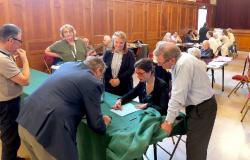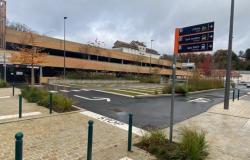259,000 voters in Haute-Vienne are being called to the polls this Sunday, July 7, to elect their deputies, for a second round of high suspense.
In the context of an unprecedented upheaval in the balance of power between political blocs, a historic election will be held this Sunday, July 7. In Haute-Vienne, the left will attempt to retain the three constituencies that it had snatched from the presidential majority in 2022.
The challenge is considerable, as the National Rally has largely confirmed, and even accentuated, its European momentum during the first round of these decidedly very atypical legislative elections.
Nevertheless, on June 30, the three outgoing deputies (two LFI and one PS) gathered under the banner of the New Popular Front 66,285 votes (36.36% of the votes), or 2,532 votes more than the extreme right (34.97%). The left came out on top in two out of three constituencies and was only beaten in the southwest of the department, by only 19 votes.
The Republican Front: an abstract and fragmented notion…
Will this relative resistance of the left be confirmed on Sunday, in the face of the RN wave? No one can say for sure, as this second round of the legislative elections contains so many unknowns. The greatest uncertainty undoubtedly lies in the fact that the “republican front”, which had until now made it possible to contain the advance of the extreme right thanks to a strategy of systematic withdrawals in favor of the best-placed candidate, is now nothing more than an abstract and fragmented notion.
In Haute-Vienne, with the exception of the 2nd constituency where the Modem candidate did not wish to take the risk of an RN victory against the socialist incumbent, the “Republican Alternative” embodied by the local right chose to remain in the other two constituencies.
It remains to be seen what the consequences of this politically risky approach will be on the outcome of the election…
First constituency: the incumbent in a favorable position
Having come out on top in the first round with a lead of 2,367 votes (36.94%) over his opponent from the National Rally (32.83%), the outgoing MP Damien Maudet (NFP/LFI) would be in a favourable position.
But he will still have to deal with the candidate of the centre-right Republican Alternative, Isabelle Négrier, who, having come in 3rd place on 30 June (26.99% of the vote), did not wish to withdraw her candidacy and did not hesitate to reiterate her greatest reservations regarding La France Insoumise, which she considers too radical.
Damien Maudet will therefore not benefit from a “republican front” likely to help him confront a far right whose performance is worth highlighting here: parachuted in from Creuse, the National Rally candidate Camille Dos Santos de Oliveira still captured nearly a third of the votes in the first round. Unless we imagine that part of Isabelle Négrier’s electorate – the most right-wing – could switch to her name by choosing an atypical form of “useful vote”, her reserve of votes nevertheless appears quite low. Conversely, Damien Maudet can hope to gather around him the part of the Republican Alternative most hostile to the far right and which would then opt, for its part, for a choice of “security”.
There remains the unknown of participation (it was very high on June 30 with 71% of voters) and that linked to the volatile nature of the electorate, whose behavior is not necessarily an exact science…
From absolute majority to institutional blockage, what are the possible scenarios after the second round?
Second constituency:
the same PS/RN duel as in 2022
As in 2022, when he won with 61.5% of the vote, the socialist Stéphane Delautrette will be alone facing the candidate of the National Rally, Sabrina Minguet.
By officially announcing her withdrawal this Tuesday, July 2, Marie-Ève Tayot (Modem) should make the task easier for the outgoing MP, even if the game is not won in advance.
“The situation does not allow me to take the reckless risk of making the National Rally win,” declared the candidate of the Republican Alternative, who does not hide the fact that her decision was made easier by the fact that the representative of the New Popular Front here is a socialist.
It remains to be seen to what extent the 16,937 votes (24.45%) obtained by the centrist candidate will be transferred to the PS candidate, known for his moderation, in this election with many unknowns.
On June 30, Sabrina Minguet came out on top (36.86%), but with only 19 votes ahead of Stéphane Delautrette (36.83%), all in a context of very high turnout (73.89% of voters). Has the far right won all its votes or does it have enough reserves? How will the abstainers in the first round behave? So many questions that remain unanswered for the time being.
For her part, Marie-Ève Tayot did not give any voting instructions, but nevertheless specified: “The RN is the antithesis of the values of humanism and tolerance to which I am deeply attached and which have always guided my career.”
In Haute-Vienne, mayors dismayed by the scale of the RN vote
Third constituency:
A tough battle for the left
As in the first constituency, there will be no Republican front in the north of Haute-Vienne.
To save her seat and keep the third constituency on the left, Manon Meunier (NFP/LFI) will therefore have to face two candidates alone, one from the far right, the other from the centre-right.
But here the battle promises to be tougher. In the first round, only 184 votes separated the outgoing MP, who came in first with 35.18% of the vote, from Albin Freychet (34.85%). The candidate of the National Rally, who is also the local leader of Jordan Bardella’s party, is not unknown in Haute-Vienne and is not a beginner in politics. An observation that could work in his favor, especially since his progress compared to 2022 (he was already a candidate but had not managed to get past the first round) is spectacular, with a gain of 11,000 votes in two years.
But for her part, Manon Meunier also now has a certain notoriety. Also benefiting from the surge in participation (71.36%) in the first round, she has shown notable progress since the last legislative elections (+ 6,415 votes).
The referee of the vote will therefore undoubtedly be Gilles Toulza (Les Républicains). Last Sunday, he captured 26.65% of the votes, or 14,768 votes. The consequences of his staying in the race on the outcome of the vote are very uncertain. But he is not giving up: “15,000 voters have trusted me and they want neither the RN nor LFI.”
Legislative: 63% of French people are opposed to an absolute majority for the RN, according to a latest poll
Florence Clavaud-Parant





